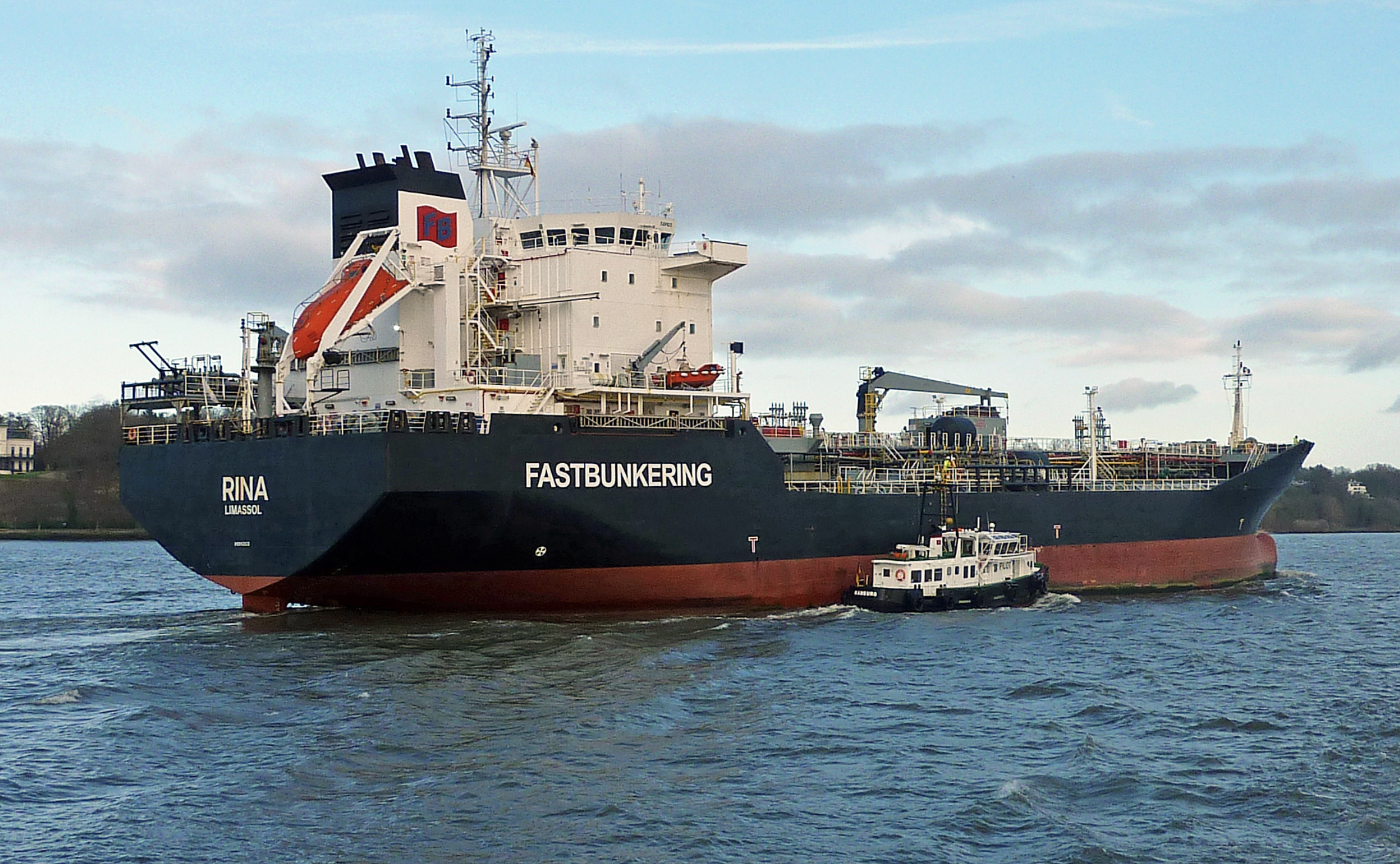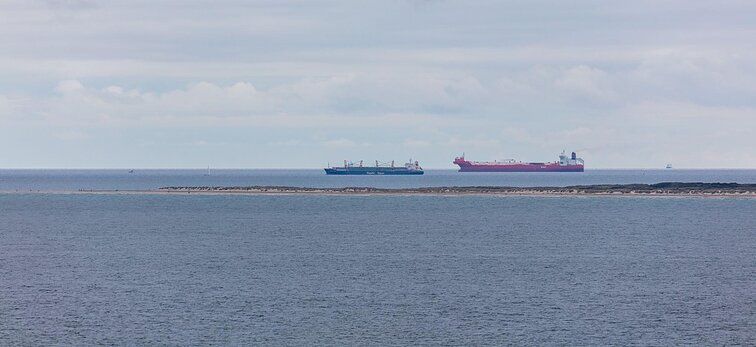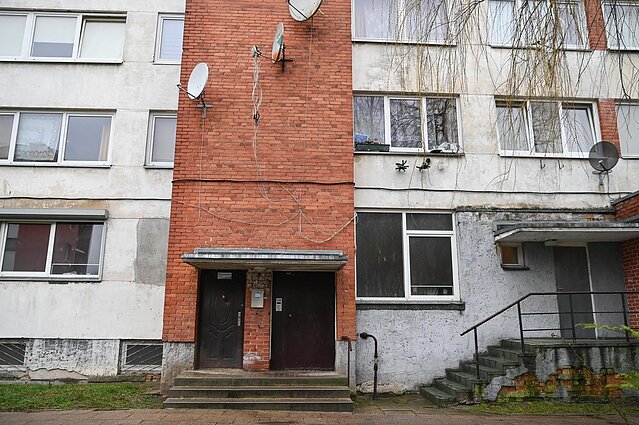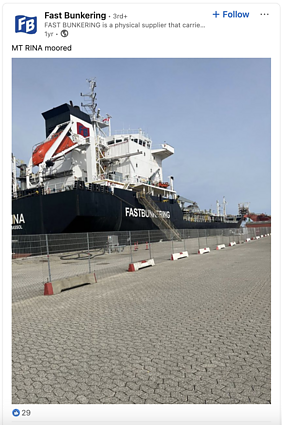Investigation
How Baltic firms secretly fuel Russia's 'shadow fleet'
It is 8 March, an overcast morning – the crew of the bunker tanker Rina are prepared for another day of hard work at sea. Operating like a floating fuel station, this vessel refuels other ships passing through the Danish straits.
Work is plentiful here. The waterway connecting the Baltic and North Seas is one of the busiest in the world. On average, around 200 ships pass through daily.
Among them are tankers from Russia’s shadow fleet – old, uninsured vessels with unknown ownership, helping Russia circumvent Western sanctions by selling Russian oil and petroleum products globally and, in doing so, helping keep the Russian war economy afloat.
At 11 AM, one of such vessels approached Rina for refuelling – a crude oil tanker named Blue, capable of carrying up to 1,000,000 barrels of oil – en route to Primorsk, one of Russia’s main oil export terminals. From there, it was scheduled to deliver crude to a refinery in Mangalore, India.
On that morning of 8 March, as Blue took on fuel near Skagen port, an Antigua and Barbuda flag was fluttering on its deck. Formally the only vessel owned by an obscure Turkish company registered in an apartment in a small port town near Istanbul, the 20-year-old tanker routinely disables its Automatic Identification System (AIS) – a common shadow fleet tactic to conceal its route, the origin of its oil, and mid-sea transfers (STS) to other ships.
In fact, Blue had previously been spotted off the coast of Greece transferring Russian oil to an EU-sanctioned tanker named Ligera – in violation of sanctions – which then sailed to Venezuela.
Eight months later, in October, Blue was refuelled by another bunker tanker, Zircone. This time, it happened near the Swedish island of Gotland, alongside the main tanker route from Russian ports.
Rina and Zircone belong to FB Trade, a company registered in Dubai. However, its connections and true owners lead to the Baltic bunkering giant Fast Bunkering, which until recently operated in the port of Klaipėda.
An investigation by LRT, 15min, Eesti Ekspress, and Nekā personīga found that between June 2024 and March 2025, the bunker tankers Rina and Zircone conducted 286 ship-to-ship operations, refuelling 177 oil and oil product tankers, of which at least 159 had called at Russian ports shortly before or after these transfers.
We showed our findings to Anatalii Kravtsev, an analyst at the Kyiv School of Economics.
According to his analysis, at the time Rina and Zircone supplied fuel, at least 20 of those tankers showed clear signs they were part of the Russian shadow fleet.
“Specifically, these vessels lacked insurance coverage from any member of the International Group of P&I Clubs, and their owners and management companies were registered outside the jurisdictions of the Oil Price Cap Coalition,” said Kravtsev.
Over a period of nearly 10 months, the two ships refuelled them at least 30 times.
In August 2024, in one such instance, the tanker Rainbow met Zircone between Gotland and Latvia while carrying 37,000 tons of refined oil from Russia’s Primorsk port to Brazil. MarineTraffic data show the ship-to-ship transfer lasted from 13:39 to 16:40.
A similar operation took place in n December 2024, when Rina refuelled Rainbow en route from Primorsk to Libya.

While international sanctions permit exceptions for refuelling vessels transporting Russian oil, stringent legal conditions apply.
“Bunkering companies must conduct thorough checks, maintain transparent documentation, and comply with all legal standards,” according to Petras Katinas from the Centre for Research on Energy and Clean Air.
That includes verifying not only that the oil cargo adheres to the G7+ price caps, but also that the tanker does not exhibit shadow fleet characteristics – such as lacking valid insurance, working with sanctioned entities, or violating maritime safety procedures. This was also confirmed by Alexander Prokopakis, executive director at the International Bunker Industry Association.
Despite these rules, on 21 March Rina carried out a mid-sea transfer with the notorious shadow fleet tanker Fotuo in the Danish port of Skagen. The next day, it was also refuelled by Zircone. In the course of nine months, both of them carried out two more mid-sea transfers with Fotuo. In May, it was added to the European Union (EU) and UK sanctions lists due to high-risk shipping practices.

Even though none of the 177 vessels Rina and Zircone serviced were sanctioned during the time of refuelling, just like Fotou, 19 more of their client tankers were later added to the EU, US, or UK sanction lists.
Twenty-seven more are mentioned as belonging to the shadow fleet or linked to sanctioned entities in the database of OpenSanctions, which monitors international sanctions.
Despite the EU’s growing efforts to crack down on the Russian shadow fleet, Rina and Zircone continue to supply fuel to these tankers without interference, enabling this network to thrive.
Fast Bunkering, a Baltic oil empire
The building No 11 on Debreceno Street in Klaipėda, a dormitory-style apartment block, looks no different from other buildings in this part of the city.
One of its apartments is registered under the company Saurix Kuras – in 2023, its sales exceeded €50m, and in 2022 they had been even higher, reaching €60m. The company’s business model was simple: in the port of Klaipėda, Saurix Kuras supplied fuel to various ships from the bunker tanker Grumant.

However, while generating a seemingly significant turnover, this company is only a small subsidiary of a much larger Estonia-based corporate network, Baltic Sea Bunkering. Maritime industry insiders know it better under the brand Fast Bunkering, which is also the name painted on its tankers.
The founder of Fast Bunkering, Aleksei Tšulets, began building his business empire immediately after Estonia regained independence.
Together with his business partners Sergei Pasters and Aleksei Mürisep, he rapidly developed a business spanning fuel import, bunkering, maritime logistics, land transport, and real estate. By the end of the 1990s, he was regularly listed among Estonia’s wealthiest by the business daily Äripäev, and in 2014 his assets were estimated at nearly €50m.
Baltic Sea Bunkering subsidiaries and other companies associated with the businessman operated in the ports of Riga and Klaipėda, and also acquired the entire Estonian port of Paldiski North, which became the main center of operations for Fast Bunkering. Over time, Tšulets’ influence in the city of Paldiski, one of Estonia's main export arteries, grew to such an extent that some media outlets dubbed him “the owner of the city”.
Over the years the company became notorious for using offshore companies and various schemes to obfuscate their dealings. For example their ownership of the port of Paldiski was only revealed when the EU started to demand ultimate beneficial owners be declared.
According to a 2020 company presentation uploaded to the trade platform ExportHub, Fast Bunkering’s biggest subsidiaries – NT Bunkering AS and Fast Bunkering SIA – supplied around 1.5m tons of marine fuel annually, operating both as physical suppliers and traders in various countries, including Russia.
The same presentation listed the company’s main clients as major Danish, Swedish, Estonian, and Russian shipping firms, including Maersk A/S, J. Lauritzen A/S, Minerva Marine, SCF Group, DFDS, Stena Line, Finnlines, Tallink, and TFG.
At the time, the Fast Bunkering fleet consisted of at least seven tankers, according to its website, which is no longer functioning.
In the shadows
Despite his remarkable success, Tšulets, who has long avoided public attention, has attracted various suspicions of opaque business practices. As early as 1993, Estonian media reported that his company, AS Infast, might have been selling German oil provided to Estonia as humanitarian aid in Sweden.
In early 2022, an international journalistic investigation revealed that Fast Bunkering was transporting Russian oil products from Belarus, despite EU sanctions on the Belarusian regime for repression of the opposition.

The investigation showed that Fast Bunkering’s companyTintrade had a contract with the Belarusian firm NNK, linked to the sanctioned oligarch Mikalai Varabey. NNK’s oil products were imported into the EU using falsified customs codes and later transited through ports in Estonia and Latvia.
The situation escalated further in February 2022, when Russia launched its full-scale invasion of Ukraine. In response to the aggression, the EU banned the maritime import of Russian crude oil. In February 2023, this embargo was extended to oil products – diesel and fuel oil – which formed the main part of Fast Bunkering’s trade.
However, this apparently did not stop the Estonian businessman from attempting to keep making a profit.
In 2023, Estonian authorities launched an investigation into one of Fast Bunkering’s companies, NT Bunkering, suspected of submitting falsified documents that labelled Russian fuel as Kazakh. Investigators raided Fast Bunkering group companies and seized NT Bunkering’s assets, including a Porsche car valued at around €100,000.
The Estonian Prosecutor General’s Office informed that the pre-trial investigation is still ongoing. “Therefore, we cannot comment on its content,” the office wrote in a statement.
Russian fuel in Klaipėda?
Data gathered by journalists indicate that the Russian fuel in question may have reached Klaipėda. Financial reports show that, in 2022, the Lithuanian company Saurix Kuras bought over €30m worth of oil products from NT Bunkering.
Sources familiar with the company’s documents claim that Russian-origin fuel was shipped to Klaipėda by the Fast Bunkering tanker Ristna, then transferred to Grumant and supplied to Saurix Kuras clients.
After sanctions were imposed, the fuel’s origin was systematically masked on certificates, listing Kazakhstan and other countries instead of Russia where the products really came from.
Saurix Kuras was not inspected for potential sanctions violations between 2021 and 2025, according to Lithuanian Customs. Data from the nonprofit Global Fishing Watch shows that Ristna visited Klaipėda at least 27 times in 2023.
Competitors have also flagged Fast Bunkering’s activities. In November 2023, the global bunkering giant Bunker One filed a complaint with Danish authorities, alleging that Fast Bunkering tankers were violating fair competition rules in the Danish straits by supplying Russian bunker oil. The company dismissed the claims as a competitor’s attempt to undermine them.
In April 2024, Fast Bunkering had to deny allegations once again, this time about supplying fuel to the Russian shadow fleet. An investigation by the Swedish broadcaster SVT revealed that ships owned by these Estonian and Latvian companies had, over the course of two months, supplied fuel to more than 50 oil tankers travelling to and from Russian ports across international waters near Gotland.
That same month, Greenpeace activists painted “Oil fuels war” on the side of Zircone.
Amid mounting legal and public pressure, board member Aleksei Mürisep has acknowledged that the sanctions have shattered Fast Bunkering’s business model.
“It’s all over,” he told the Estonian business daily Äripäev. By 2024, the company had sold its Baltic Sea tankers.
However, this investigation reveals that, despite having changed owners, two of the group’s vessels, Rina and Zircone, remain controlled by companies linked to Fast Bunkering and still sell fuel to tankers carrying Russian oil, including those that belong to the shadow fleet.
Smoke and mirrors
Under current EU rules, a company selling a tanker is responsible for verifying the buyer’s identity and intended use. The requirement was introduced specifically to prevent tankers from being transferred to Russia’s shadow fleet.
According to Fast Bunkering owner Tšulets, his ships were sold to an unnamed EU company to ensure compliance with these rules. Public registries and financial reports show that the new owner is the Latvian company Welton Enterprises SIA.
While formally the company does not belong to the Fast Bunkering group, it carries the same name as an Estonian company owned by Tšulets and his partners.
The sole shareholder of Welton Enterprises SIA in Latvia is Eduards Borisovs, a Latvian citizen who also serve as the head of Baltic Sea Bunkering’s Lithuanian subsidiary Saurix Kuras.
Until 2023, the Latvian Welton Enterprises SIA had had a different name, different owners, and almost no revenue.
According to Latvia’s business registry, it was originally registered in 2018 as SIA Rent Flat, then changed name to SIA YOLA in 2019 and became FB Shipping in 2023 after a change of ownership. That same year it was renamed to Welton Enterprises SIA.
Despite having reported virtually no revenue, the company could dole out a total of €6.3m to purchase the vessels Rina, Zircone, and another NT Bunkering ship, Onyx.
When contacted for comment, Borisovs said he was busy and promised to talk the following week, but later did not respond to calls or emails.
However, once purchased, the tankers did not stay long in Borisovs’ hands. By the first half of 2024, all of the three ships had been sold again. This time to the Dubai company FB Trade.
While Rina and Zircone continued operating off the coast of Denmark and the island of Gotland, Onyx was transferred to the strait of Hormuz. The vessels still display their old logo, and their services continue to be promoted by Fast Bunkering’s social media channels, under the Fast Bunkering name.

According to the Latvian business register, the selling price was nearly the same as that with which the vessels had been bought the year before.
Safe haven
After Russia’s invasion of Ukraine, Dubai became a haven for companies seeking to operate in the EU market while remaining difficult to trace. Access to corporate registries in the United Arab Emirates is extremely limited, often making it impossible to identify the ultimate beneficiaries of companies.
“Relocating companies to Dubai has become a common trend, because you can hide anything there. Many Russian firms operating shadow fleets moved to Dubai,” the maritime expert Salvatore R. Mercogliano said.
The Dubai-based company FB Trade provides almost no public information, but its logo is identical to that of Fast Bunkering.
Records show the company was registered by the Estonian citizen Vadim Frolov, a former fuel supply specialist at Latvia’s Fast Bunkering, who also founded Fast Bunkering AS in Estonia.
The Estonian company is yet another clone. It bears the same name as the original Latvian company and employs as many people, but its ultimate beneficial ownership reveals it is not part of the Baltic Sea Bunkering group. Fast Bunkering AS seems to have been created solely to divert company operations away from the original group.
Tšulets strongly denies any connections to the Dubai-registered company when speaking to journalists. “The questions should be directed to the new owners of the ships,” he said, claiming he has been out of the bunkering business since 2023.
However, after journalists asked Tšulets about his connections to the Dubai company, sudden changes occurred in the management of the investigated vessels.
According to the public EQUASIS database, while owned by the Dubai company, Zircone was managed by a Baltic Sea Bunkering subsidiary until mid-September. Following inquiries from journalists, the management responsibilities were transferred to the Latvian company SIA Ship Service. In the case of Rina, the same company took over its international safety standards (ISM) management from the Estonian Welton Enterprises. After these changes, both ships were no longer administered by the Baltic Sea Bunkering group.
However, there are links between SIA Ship Service and the group.
Its current owner, the Latvian citizen Pavels Gorelikovs, previously worked at one of Fast Bunkering’s companies and registered the FB Trade website. He acquired SIA Ship Service in September this year and the company is registered at the same address as Fast Bunkering’s Riga office.
Moreover, Gorelikovs’ other company BonCrew, which specializes in seafarer recruitment, has been providing services to Fast Bunkering for several years.
When asked about the vessels, Gorelikovs said he only knew about the technical side of things, while it was the owner of the ship who dealt with commercial management.
“I can tell you about engines, but not about the commercial side,” he said.
We showed our findings to Marika Kütt, legal council at the top Estonian law firm Ellex Raidla specialising in sanctions-related questions. She has confirmed that these sorts of activities are suspicious.
“The use of front persons in business activities, as well as frequent changes of ownership and other key positions, is in itself considered a red flag under the European Union’s issued guidelines, indicating a possible scheme to circumvent sanctions,” said Kütt.
According to public information the activities of the vessels have not remained unnoticed at the official level either. In February the Canadian government sanctioned a Latvian entity called Fast Bunkering Holding Ltd.
When we asked Tšulets about this, he pointed out that there is no company by that specific name, i.e Fast Bunkering Holding, and he has received no notice from the Canadian government about the sanctions, even though he has reached out to them for clarification.
In August, Ukrainian president Volodymyr Zelenskyy signed a decree adding Fast Bunkering Holding Ltd to the Ukrainian sanctions list as well. The Ukrainians however also added an address and a Latvian tax number, which point to the Latvian company Fast Bunkering SIA.
This time, Tšulets came back with a different answer, namely that he is no longer the owner of the Latvian company. As it turns out, in April this year, ownership was transferred from Tšulets and Sergei Paster to Vladimir Müürisepp and Oksana Pasters. To our knowledge, Müürisepp is Tšulets’s cousin as well as a board member in five Baltic Sea Bunkering subsidiaries, including Fast Bunkering AS and Oksana Pasters is Sergei Pasters’s wife.
A shadow fleet that won’t sink
The tangled operations of Fast Bunkering reveal why policing the world’s shipping lanes remains so difficult. Despite the EU’s increasingly tight sanctions regime aimed at dismantling Russia’s shadow fleet, analysts say it continues to move oil across international waters with little interruption.
“The threat is growing. Russia sees this [shadow fleet] as an effective weapon – both to undermine European security and to keep its oil flowing,” said Lithuania’s foreign minister Kęstutis Budrys.

“We’re probably not far from a major environmental disaster. Sanctions do work, but we’re too slow to impose them. By the time restrictions take effect, Russia has already made its money,” he continued.
While regulators scramble to catch up, companies operating inside the EU waters, like Fast Bunkering, apparently keep doing business largely undisturbed.
According to one former Fast Bunkering owner, Pasters, who is currently in a legal dispute with his former partner Tšulets over alleged embezzlement of assets, the shadow fleet turned out to be exactly what was needed to turn a low-profit bunkering business into a real money maker.
“Until 2022, bunkering in the largest Danish strait had been unprofitable, but that year, when sanctions were imposed on Russia and many fuel suppliers stopped servicing Russian ships or vessels carrying Russian goods, supply margins increased sharply,” Pasters said.
When Frolov, the director of the company that now owns the bunkering vessels, was contacted, he ignored the questions relating to his possible working relationship with Tšulets and the companies in Estonia and Latvia or similarities with Fast Bunkering.
He said that FB Trade “collaborates with local authorities prior to each operation it undertakes”.
The Danish Marine Authority commented they were “monitoring the situation”, but did not clarify how they checked the company’s operations, most of which take place in Danish waters.
Fast Bunkering isn’t the only company providing bunkering services that help transport Russian oil around the world. According to the financial analytics firm S&P Global, over the 12 months before April 2024, at least 3,100 refuelling operations involving Russia’s shadow fleet tankers had occurred near the coasts of Malta, Greece, Spain (Gibraltar), the Netherlands, and other European countries.
Such operations will likely remain highly profitable as long as they operate in the legal grey zone.
“Since Russia’s invasion of Ukraine, the number of these so-called ‘dark fleet’ vessels has tripled. Russia has spent billions of dollars building this network. In that sense, the sanctions have failed to achieve their intended goal – instead of making the seas safer, they’ve made them more dangerous,” says maritime intelligence analyst Michelle Wiese Bockmann.
Every month, hundreds of thousands of people read the journalism and opinion published by EUobserver. With your support, millions of others will as well.
If you're not already, become a supporting member today.
Author Bio
Augustinas Šulija (LRT), Kaur Maran (Eesti Ekspress), Gabrielė Navickaitė (15min), Guna Gleizde (Neka personiga)
Related articles
Tags
Author Bio
Augustinas Šulija (LRT), Kaur Maran (Eesti Ekspress), Gabrielė Navickaitė (15min), Guna Gleizde (Neka personiga)